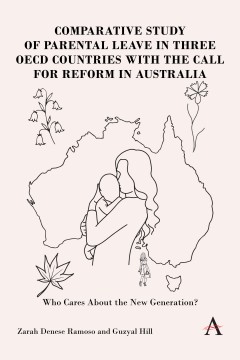Balancing Work and New Parenthood
A Comparative Analysis of Parental Leave in Australia, Canada, Germany and Sweden
By Zarah Denese Ramoso & Dr Guzyal Hill
Other Formats Available:
- About This Book
- Reviews
- Author Information
- Series
- Table of Contents
- Links
- Podcasts
About This Book
This book provides a critical examination of paid parental leave policies in Australia and compares them with those of similar member countries of the Organisation for Economic Co-operation and Development (OECD). While all OECD member countries, except the United States, guarantee some form of paid parental leave to mothers, the duration, benefits, job protection, and eligibility vary greatly. The substantial disparity in parental leave policies between Australia and other OECD countries raises questions about the effect of Australian policies on gender inequality in the workforce, women's workforce participation, and child and parental health.
The book presents two key recommendations for Australia's paid parental leave policies. The first recommendation is to extend the current paid parental leave to a total of 52 weeks for optimal child and maternal health, in line with the World Health Organization's recommendation. The second recommendation is to introduce an individual 15-week 'maternity leave' provision exclusive to mothers, bringing the overall duration of leave available to mothers to 52 weeks, which is approximately 70% of the provisions offered by the featured OECD countries. These reforms may be introduced in stages.
The book discusses the parental leave schemes of Germany, Canada and Sweden as points of reference for Australia because of their similar funding of paid parental leave through general taxation and their clear and succinct legislation regarding paid parental leave rights. The recommendations, if enacted, will foster Australian mothers' rights through a reconstructive feminist lens by celebrating women's differences with men and removing any disadvantage women may have in meeting masculinized social norms.
While the Australian government's 2021 announcement of an additional $1.7 billion investment in childcare will help mothers to return to work, it does little with regard to the government's parental leave scheme that places the onus for the care of the newborn or newly adopted child entirely on the mother, while failing to also provide paid parental leave for fathers. Moreover, while increased funding for childcare may help mothers return to work after the 18-week paid parental leave is over, such policy does not address the importance of raising the child at home with a parent for at least the first year of the child's life. The support of parents is instrumental in countries with an aging population and Australia is one such country. Overall, this book calls for urgent attention to be paid to parental leave policies in Australia to address issues of gender inequality, workforce participation, and child and parental health.
Reviews
“This insightful monograph brings to the fore an extensive exploration of the ‘untold story’ of Australia’s parental leave history and its impacts. It asks: ‘who cares about the next generation?’, a crucial question that both government and business must confront and rise to meet in a post-COVID economy – the act of caregiving and the role of caregivers in our society have never been more exposed as undervalued and under-invested in. I highly recommend any public or private sector employer or individual interested in the future of work and the well-being of our future generation to read this comparative study. It will open your eyes to a far bigger picture of the conflicting influences that require addressing if we are to prosper as a thriving nation.” —Emma Walsh, CEO of Parents At Work and Founder of Family Friendly Workplaces, Australia.
“This is an important contribution to shedding light on paid parental leave in Australia. As the writers note, Australia’s scheme lags behind the majority of other OECD nations. The comparisons with Germany, Sweden and Canada show the urgency for the reform of paid parental leave in Australia.” —Professor Susanne Garvis, Griffith Institute for Educational Research, Australia.
Author Information
Zarah Ramoso is a mother, lawyer, and author who is passionate about women's empowerment and bridging the gap between motherhood and women’s career.
Guzyal Hill is a mother, lawyer, and academic who is passionate about legal research and the contribution it makes to future generations.
Series
Anthem Impact
Table of Contents
Foreword; 1. Introduction; 2. Rights to Parental Leave; A Feminist Jurisprudence; B Global Frameworks; C International Labour Organization Standards; 3. Australia’s Paid Parental Leave; A Paid Parental Leave Scheme; B Employer-Paid Parental Leave; C Domestic Laws; 4. Paid Maternity and Parental Leave in Comparable OECD Countries; A Canada; B Germany; C Sweden; 5. Call for Law Reform; Conclusions
Links
Stay Updated
Information
Latest Tweets



